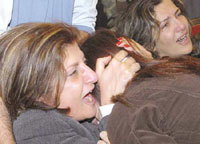Lamenting Lebanon stages farewell to top general slain in car bombing
Mourning Lebanon bid farewell to a top general who was killed in a car bombing two days ago.

In pouring rain, the casket of Maj. Gen. Francois Hajj was taken from the military hospital to his house in suburban Baabda, minutes away from where a car bomb incinerated his vehicle Wednesday, killing him and his driver, the AP reports.
An army honor guard played somber music as the casket was driven to a Maronite Catholic basilica in the Christian mountain heartland north of Beirut for an official service. Later, the flag-draped is to be driven halfway across the country for burial in Hajj's southern hometown of Rmeish, near the border with Israel .
Hundreds of grieving Lebanese lined up along the route of the procession, with roads adorned with the Lebanese red-and-white flag with the green Cedar tree.
Hajj, who headed military operations and was next in line to become the country's army chief, held the rank of brigadier general but he was promoted to rank of major general after his death.
Away from the shock and tears, an investigation into Hajj's assassination continued.
In the southern city of Sidon, security agents detained Wednesday four Lebanese in whose names the car used in the bombing was registered, a security official said.
Authorities were also looking into the possible involvement of al-Qaida-inspired extremists seeking vengeance against Hajj, who had led a major offensive against Islamic militants last summer.
He was credited with crushing al-Qaida-inspired fighters known as Fatah Islam who had barricaded themselves in a northern Palestinian refugee camp, Nahr el-Bared, to battle the military from there for three months. Hundreds of militants, as well as 168 soldiers, were killed in the fighting, which ended in September. The leader of Fatah Islam escaped the siege.
Hajj's slaying came as Lebanon is embroiled in the latest chapter of its yearlong crisis _ a dispute over electing a new president. The post has been left empty since Emile Lahoud's term ended Nov. 23, with supporters of the Western-backed government and the opposition, led by pro-Syrian Hezbollah, unable to agree on a successor.
The beleaguered government sought to reassure the public, many of whom were worried that even the military - seen as the sole institution holding the country together - was now a target in Lebanon 's unending political turmoil.
U.S. President George W. Bush condemned the assassination and took a tough tone against Syria , calling on it to stop interference in Lebanon - although he did not accuse Damascus in the slaying.
Bush said Hajj was "a supporter of Lebanon's independence and an opponent of Syria 's interference in Lebanon's internal affairs."
Hajj was not known as an anti-Syrian figure in Lebanon . He was an ally of anti-Syrian Gen. Michel Aoun in the late 1980s. But in the next two decades, Hajj rose steadily into the top echelons of the military at a time when Syria controlled Lebanon, which he would not have been able to do without being on good terms with Damascus .
Army commander Gen. Michel Suleiman has emerged as a consensus candidate to become the next president, though his election has been held up by political wrangling in parliament. Hajj was a front-runner to succeed Suleiman as head of army.
Some anti-Syrian politicians on Wednesday accused Damascus of being behind the bombing to try to torpedo the presidential election. But on Thursday they muted their rhetoric after Suleiman called on Lebanon's divided factions to avoid "politicizing" Hajj's death.
Security officials said there was a strong possibility that Islamic extremists or dormant Fatah Islam cells carried out the attack.
The four suspects were picked up from Taamir neighborhood on the edge of the Ein el-Hilweh Palestinian refugee camp, where Islamic militant groups are known to operate.
During the Nahr el-Bared fighting, Palestinian militants in Ein el-Hilweh camp threatened to form "Jihadi groups" to fight alongside Fatah Islam.
The four are not yet suspects in the bombing and were being questioned about their connection to the car, the official said, speaking on condition of anonymity in line with government rules.
Hajj's assassination in the high-security Baabda area where the Defense Ministry and the presidential palace are located underlined fears among many Lebanese that no place or person is immune from the violence that has wracked the country since2005.
Prime Minister Fuad Saniora, who has asked the United Nations for assistance in resolving Hajj's slaying, has vowed the latest bombing "will only make Lebanon, the Lebanese government and the Lebanese army more determined to stand in the face of strife."
Ahead of the funeral, about 500 people marched to the scene of the bombing for a candlelight vigil, holding pictures of Hajj and praying.
Subscribe to Pravda.Ru Telegram channel, Facebook, RSS!




